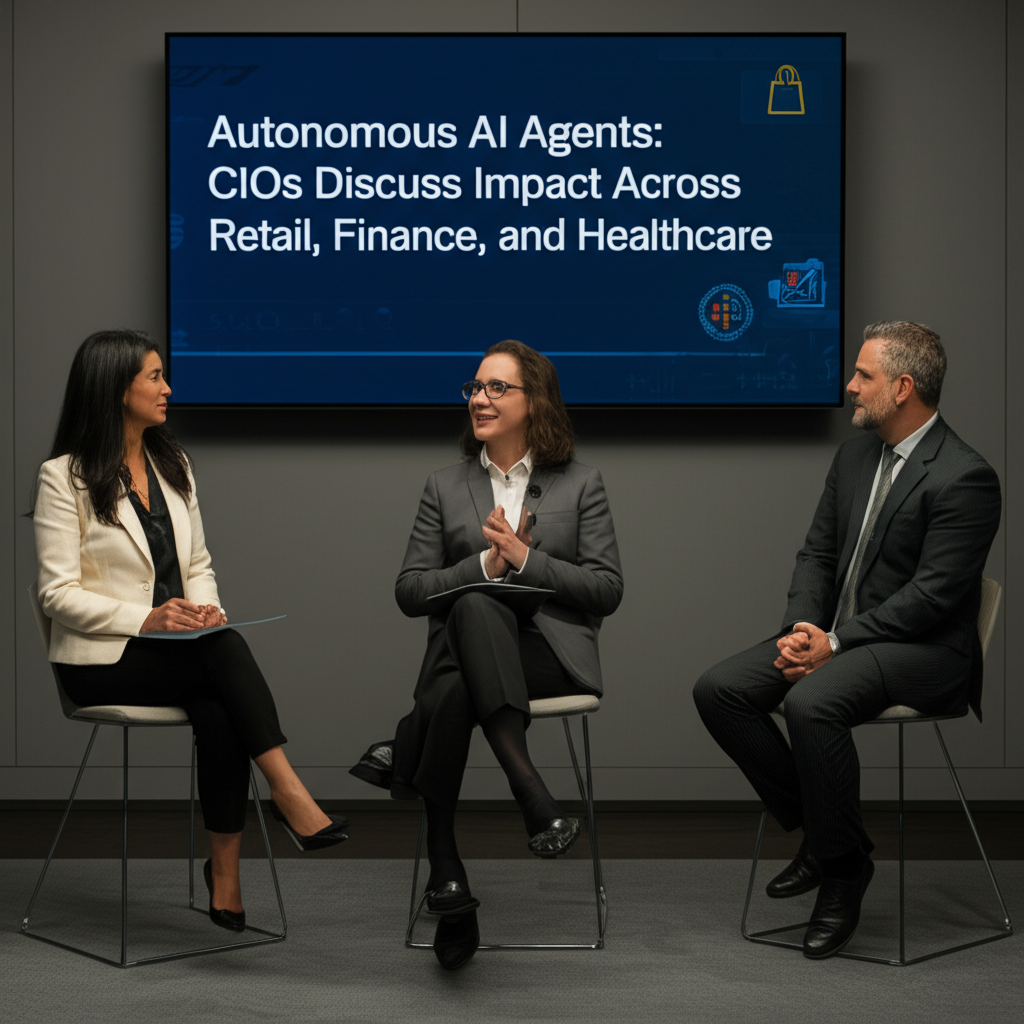Autonomous AI Agents: CIOs Discuss Impact Across Retail, Finance, and Healthcare

Credit: Shubham Dhage | Unsplash
Agent-based AI, often referred to as agentic AI, is rapidly emerging as one of the most transformative technologies in the enterprise landscape. Its ability to perform complex tasks autonomously, make decisions, and interact with environments is capturing the attention of IT leaders across industries. According to Gartner, this technology is currently climbing the 'peak of inflated expectations' on the Hype Cycle, with a projected timeline of five to 10 years to reach mainstream productivity. This trajectory suggests that while the immediate impact is still developing, the long-term potential is significant.
Industry analysts echo this sentiment. IDC, for instance, posits that while AI assistants currently dominate the market, the true revolution lies with autonomous agents. IDC predicts that by the early 2030s, AI agents could fundamentally change how businesses operate, potentially replacing entire applications. Imagine a future where a fleet of specialized AI agents handles tasks currently managed by complex Customer Relationship Management (CRM) software, optimizing interactions and workflows with unprecedented efficiency and personalization.
The interest from IT leadership is palpable. A recent Microsoft report highlighted that a staggering 82% of IT leaders anticipate deploying agents as digital team members within the next 12 to 18 months. This indicates a rapid shift towards integrating AI agents into the core workforce, expanding capacity and redefining roles. Microsoft even foresees the emergence of a new professional function: the agent manager, tasked with overseeing and optimizing the performance of these AI teammates.
Despite this near-unanimous belief in the future importance of agent-based AI, its development and widespread deployment remain in the nascent stages. A recent study by Globant points to three sectors that are currently experiencing the most significant early impact of agentic AI: finance, retail, and healthcare. These industries, characterized by complex operations, vast amounts of data, and critical customer/patient interactions, stand to gain substantially from the capabilities of autonomous agents.
Gonzalo Goñi, Director of Solutions Engineering at Salesforce, a company actively developing platforms like Agentforce to manage AI agents, observes this trend firsthand. "Agent adoption is booming, and for now, what we're seeing is a clear and progressive acceleration," Goñi states. "Organizations are rapidly moving from experimentation to production and are increasingly integrating these agents as a structural part of their operations."
To understand this early wave of adoption and the future vision for agentic AI, we turn to IT leaders within these pioneering sectors. CIOs and directors from finance, retail, and healthcare share their insights on how their organizations are currently leveraging AI agents and where they believe this technology will take their industries in the years to come.
Integration in Retail: Enhancing Customer Experience and Operations

Salesforce.
Gonzalo Goñi of Salesforce notes that while demand for AI agents is rising across all sectors, the retail industry has been particularly dynamic in its exploration and implementation of agentic AI. The primary focus areas in retail, according to Goñi, have been optimizing the customer experience and streamlining logistics operations. These areas are ripe for automation and personalization, tasks at which AI agents excel.
Fernando Herranz, Director of Digital Experience and Ecommerce at Leroy Merlin Spain, confirms this trend, anticipating a "progressive but constant integration" of agentic AI into the company's comprehensive omnichannel model. This integration is expected to yield significant benefits for both Leroy Merlin's customers and its internal teams. "AI is allowing us to move toward a more fluid and personalized relationship with the customer, and we do this by combining strategic vision with controlled and measurable applications," Herranz explains.
Leroy Merlin is actively exploring the use of agentic AI in various aspects of its business. Potential applications include automating processes within physical stores, generating digital content more efficiently, and providing personalized support to customers across both online and in-store channels. The goal is to create a seamless and highly tailored customer journey, regardless of the interaction point.
Herranz and his team are adopting a measured approach, focusing on an "orderly and focused rollout on specific use cases with measurable impact." They have already implemented initiatives such as a 24/7 virtual assistant powered by generative AI and a pilot project called Greeter AI for physical stores, designed to assist customers upon entry.
One of the significant challenges Leroy Merlin has faced is the complex task of integrating this new technology with its existing omnichannel ecosystem. Achieving real-time, scaled, and highly personalized operations requires a robust, interoperable, and continuously evolving technological infrastructure. Herranz emphasizes that this infrastructure must also ensure data protection and algorithmic transparency, which he considers "key to maintaining customer trust."

Leroy Merlin.
“AI is enabling us to move towards a more fluid and personalized relationship with the customer”
Fernando Herranz, Director of Digital Experience and Ecommerce, Leroy Merlin Spain
Looking ahead, Herranz envisions a significant expansion of the virtual assistant's capabilities. It is expected to evolve beyond basic inquiries to manage incidents, handle after-sales functions, and provide comprehensive support throughout the customer's entire relationship with the brand. This evolution highlights the potential for AI agents to become integral components of customer service operations.
Another major retail player investing heavily in AI is Carrefour. The company launched its ai.Carrefour project in Spain with the central objective of facilitating the digital transformation of its teams to improve customer service, explains Francisco Escalona, CDO of Carrefour Spain. This initiative underscores the strategic importance Carrefour places on AI in enhancing both internal efficiency and external customer interactions.
Among the solutions implemented by Escalona and his team is Super Agente Uno.ai, a virtual assistant designed to support strategic decision-making and optimize operational processes across the company. This includes areas ranging from product management and logistics to improving the efficiency of physical stores. The agent also assists in detecting new trends and strategies, such as those related to healthy and sustainable eating, and enhancing customer experience and loyalty through sophisticated data analytics.
Escalona also highlights Carrefour's ClubAI, which he describes as "the first virtual assistant with artificial intelligence for a loyalty program in Spain." ClubAI analyzes each member's preferences and purchasing habits to offer a unique and hyper-personalized experience. Its ability to interact directly with customers allows it to provide tailored recommendations and content suggestions, such as recipes based on preferences or information about nearby stores, adding significant value to the loyalty program.
The strategic deployment of these AI tools at Carrefour has been supported by the recent creation of the chain's AI Advisory Council. This council demonstrates Carrefour's deep commitment to integrating AI effectively and responsibly across its operations.

Carrefour.
“It’s an opportunity to empower talent and build a more enriching future thanks to training in tools that help us in repetitive tasks so we can focus on higher value-added activities.”
Francisco Escalona, CDO, Carrefour Spain
Both Francisco Escalona of Carrefour and Fernando Herranz of Leroy Merlin agree on a fundamental benefit of agentic AI for the retail industry: its potential to empower human talent. "It's an opportunity to enhance talent and build a more enriching future thanks to training in tools that help us with repetitive tasks so we can focus on higher-value-added activities, such as creativity, innovation, and personalized customer service," Escalona emphasizes. Herranz echoes this sentiment, sharing the mission of "freeing the team from repetitive tasks that could be automated and allowing them to focus on what adds the most value." This perspective highlights a key theme in AI adoption: not just automation, but augmentation of human capabilities.
Agents for the Financial Sector: Automating Processes and Strengthening Security
The financial services sector, with its intricate processes, vast datasets, and critical need for security and compliance, is another area where agent-based AI holds immense promise. Large financial institutions are beginning to deploy agents to automate critical operational processes, improve the efficiency and quality of customer service, and strengthen crucial functions like fraud prevention and risk management.
At Ibercaja, a financial services company, agent-based AI is viewed as "a sophisticated extension of generative AI," explains Nacho Torre, Director of Strategy, Transformation, and Data. While recognizing the potential, Torre notes that Ibercaja is still in a very early phase with agentic AI. The company is currently navigating two key aspects that require further refinement before the widespread use of AI agents can expand: regulatory compliance and operational readiness.
The financial sector is heavily regulated, and the introduction of autonomous systems requires careful consideration of compliance frameworks, data privacy, and ethical guidelines. Ibercaja is currently in an "exploration and preparation phase," focusing on establishing a solid foundation. Torre explains, "finalizing the identification and classification of existing AI systems, assessing their risks, and defining a governance model that will allow for their formal control starting in the second half of the year." This rigorous approach is essential in an industry where trust and security are paramount.
Within this developing framework, Ibercaja is already considering specific use cases for agents that will eventually be developed. The initial focus is on "simple but high-impact tasks." Torre provides an example: an agent designed to automatically connect to the Bank of Spain website every morning to download the latest legal interest rate on money. "This type of automation, although basic, represents a clear and replicable use case," Torre says. It demonstrates how agents can handle routine, data-intensive tasks reliably and efficiently, freeing up human resources for more complex work.
In the medium term, Ibercaja plans to move towards more sophisticated deployments, developing "multi-agent platforms, capable of coordinating multiple tasks and collaborating with each other." This would open the door to automating more complex and strategic processes, potentially transforming areas like portfolio management, personalized financial advice, or complex transaction processing.
Even at this early stage, Torre is keenly aware of the challenges inherent in implementing agentic AI in the financial sector. From a technical perspective, he prioritizes security and privacy above all else, given the sensitive nature of financial data. Adapting to a dynamic regulatory and market environment is also crucial. "It is essential to build flexible and scalable technological platforms capable of quickly adapting to market changes without compromising security or governance," he emphasizes. This requires a forward-thinking approach to infrastructure design and development.

Ibercaja.
“It is essential to build flexible and scalable technology platforms, capable of adapting quickly to market changes without compromising security or governance.”
Nacho Torre, Director of Strategy, Transformation, and Data, Ibercaja
From an organizational perspective, Torre highlights the need to develop technology that is "extremely easy to use and geared toward specific use cases that provide real value." This user-centric approach is vital for ensuring adoption and realizing the benefits of AI agents within the organization. The technology must be intuitive for employees and clearly demonstrate its contribution to efficiency, accuracy, or customer service.
Agentic AI in Healthcare: Supporting Professionals and Improving Patient Access
The healthcare sector, burdened by administrative tasks and facing increasing demands, also stands to benefit significantly from the capabilities of autonomous agents. Salesforce's Gonzalo Goñi contends that agentic AI has enormous potential in this field. "The use of agents can alleviate the administrative burden on healthcare professionals and improve patients' access to information," he suggests. By automating routine tasks, agents can free up doctors, nurses, and administrators to focus on patient care and more complex medical challenges.
However, Dr. Ramón Puchades, an internal medicine specialist and coordinator of the digital medicine group of the Spanish Society of Internal Medicine (SEMI), offers a more cautious perspective, noting that the integration of AI into healthcare operations is still in its very early stages. He describes the current phase as an "AI bubble," suggesting that while there is significant hype and interest, practical, validated applications are still emerging.
Puchades emphasizes that extensive studies and research are still needed to validate the most plausible and beneficial use cases for AI agents in healthcare. The stakes are incredibly high, as patient safety is paramount. However, he does identify three key fields of application where both agents and generative AI are beginning to show promise: clinical practice, research, and teaching.
In the realm of clinical practice, Puchades highlights the potential value of AI agents as tools to support diagnosis, monitor patient conditions, and track clinical progress. Agents could analyze patient data, flag potential issues, or even assist in generating initial diagnostic hypotheses for review by a human clinician. This could lead to earlier detection of problems and more personalized treatment plans.
For teaching, AI agents could be used for "slightly more active" learning experiences, perhaps simulating patient interactions or providing personalized feedback to medical students. In research, agents could prove invaluable for tasks such as conducting comprehensive searches of scientific literature, providing writing support for papers and grants, or even assisting in the complex process of recruiting eligible patients for clinical trials.
Beyond these core medical and academic functions, Puchades also sees potential for AI agents in healthcare management tasks. Agents could be used "to try to organize activities and establish patient flow," optimizing scheduling, resource allocation, and administrative workflows within hospitals and clinics. This could lead to greater efficiency and reduced wait times.
Despite these promising applications, Dr. Puchades reiterates that "all of this is still at a very early, very initial stage." He stresses the critical importance of establishing robust evidence and quality filters before deploying AI agents in clinical settings. "It's very important to establish evidence and quality filters, because they are still tools," he adds. Unlike other industries, the direct impact on human health in healthcare demands rigorous validation. "It needs validation, evidence, and quality when it comes to putting it into practice, because it's above all about providing benefits to the patient without risks." This focus on patient safety and evidence-based deployment is a defining characteristic of AI adoption in healthcare.
The Road Ahead: Challenges and Opportunities
The insights from leaders in retail, finance, and healthcare paint a clear picture: autonomous AI agents are not just a futuristic concept; they are beginning to make tangible impacts today. However, the journey towards widespread adoption is complex and fraught with challenges.
Across all sectors, the need for robust technological infrastructure is paramount. As highlighted by Herranz at Leroy Merlin and Torre at Ibercaja, integrating AI agents into existing, often complex, enterprise systems requires significant effort. Interoperability, scalability, and the ability to handle real-time data are critical technical hurdles that organizations must overcome.
Security and data privacy are non-negotiable, particularly in sensitive industries like finance and healthcare. Building AI systems that are secure by design and comply with evolving regulations (like GDPR, HIPAA, etc.) is a continuous challenge that requires significant investment and expertise. The potential for bias in AI algorithms also necessitates careful monitoring and mitigation strategies to ensure fair and equitable outcomes.
Governance and ethical considerations are also top of mind for IT leaders. Defining clear frameworks for how AI agents operate, who is responsible when things go wrong, and ensuring transparency in their decision-making processes are crucial steps in building trust and ensuring responsible AI deployment. Ibercaja's focus on establishing a formal governance model early on reflects the importance of this aspect.
Furthermore, the human element cannot be overlooked. As both Carrefour and Leroy Merlin leaders noted, a key benefit of AI agents is freeing up human talent from repetitive tasks. However, this requires significant investment in training and upskilling the workforce to focus on higher-value activities and potentially manage these new AI teammates. The emergence of roles like the "agent manager" underscores the need for new skills and organizational structures.
In healthcare, the emphasis on validation and evidence-based deployment, as stressed by Dr. Puchades, highlights a unique challenge. The pace of AI development is rapid, but the pace of clinical validation is necessarily slower and more rigorous. Bridging this gap while ensuring patient safety is a critical balancing act.
Despite these challenges, the opportunities presented by agentic AI are compelling. The potential for hyper-personalization in retail, enabling businesses to understand and cater to individual customer needs with unprecedented precision, can drive significant loyalty and revenue growth. In finance, automating critical processes can lead to increased efficiency, reduced operational costs, and enhanced accuracy in areas like fraud detection and risk assessment. For healthcare, the promise of alleviating administrative burdens, supporting clinical decision-making, and improving patient access to information could revolutionize care delivery and improve outcomes.
The journey of integrating autonomous AI agents into the enterprise is just beginning. While the "peak of inflated expectations" may bring some volatility, the underlying technology's potential to transform industries by augmenting human capabilities, automating complex tasks, and driving unprecedented levels of personalization and efficiency remains undeniable. The experiences and insights shared by leaders in retail, finance, and healthcare provide a valuable glimpse into this evolving landscape, highlighting both the exciting possibilities and the critical considerations required to navigate the path ahead successfully.
